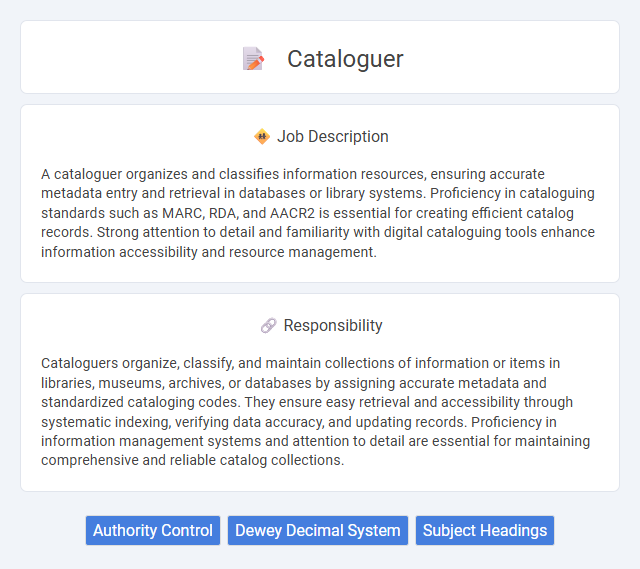
A cataloguer organizes and classifies information resources, ensuring accurate metadata entry and retrieval in databases or library systems. Proficiency in cataloguing standards such as MARC, RDA, and AACR2 is essential for creating efficient catalog records. Strong attention to detail and familiarity with digital cataloguing tools enhance information accessibility and resource management.
Individuals with strong attention to detail and a passion for organization are likely well-suited for a cataloguer job. Those who enjoy working independently in a structured environment might find this role fulfilling. People who prefer dynamic, fast-paced settings or struggle with repetitive tasks may face challenges adapting to this position.
Qualification
A Cataloguer typically requires a bachelor's degree in library science, information management, or a related field, with strong knowledge of classification systems such as Dewey Decimal or Library of Congress. Proficiency in metadata standards like MARC21 and experience with cataloging software are essential for accurate data organization and retrieval. Attention to detail, analytical skills, and familiarity with digital asset management enhance a Cataloguer's ability to manage extensive collections efficiently.
Responsibility
Cataloguers organize, classify, and maintain collections of information or items in libraries, museums, archives, or databases by assigning accurate metadata and standardized cataloging codes. They ensure easy retrieval and accessibility through systematic indexing, verifying data accuracy, and updating records. Proficiency in information management systems and attention to detail are essential for maintaining comprehensive and reliable catalog collections.
Benefit
Working as a cataloguer likely offers significant benefits such as enhanced organizational skills and increased attention to detail, which are valuable in many professional fields. It may provide opportunities to engage with diverse collections, fostering a deeper understanding of subjects and materials. The role probably supports career growth through experience with data management systems and classification standards that are widely recognized.
Challenge
A cataloguer likely faces the challenge of managing extensive and diverse data sets, requiring precision and attention to detail to ensure accurate classification. The role might involve adapting to evolving information standards and technologies, which could demand continuous learning and flexibility. Managing tight deadlines while maintaining high-quality cataloguing standards may also frequently test organizational and time management skills.
Career Advancement
A cataloguer plays a critical role in organizing and maintaining accurate records within libraries, museums, or archives, using specialized classification systems and metadata standards. Expertise in data management, digital cataloguing tools, and subject-specific knowledge enables career advancement opportunities toward senior cataloguer positions, collections management, or information science roles. Continuous professional development and certification in information management systems significantly enhance prospects for leadership roles in the archival and library sciences sectors.
Key Terms
Authority Control
Authority Control is a crucial aspect of a Cataloguer's responsibilities, ensuring consistent and accurate metadata across library databases. It involves the creation and maintenance of standardized headings for names, titles, and subjects to improve searchability and resource retrieval. Effective authority control enhances library organization, supports linked data initiatives, and enables seamless integration with global bibliographic catalogs.
Dewey Decimal System
A Cataloguer specializing in the Dewey Decimal System organizes library materials by assigning precise numerical classifications, facilitating efficient retrieval and systematic arrangement of resources. Mastery of the 10 main classes and their subdivisions within the Dewey Decimal Classification ensures accurate metadata creation and enhances user accessibility. Expertise in this system supports library management by standardizing catalog entries and improving interoperability across digital and physical collections.
Subject Headings
A Cataloguer specializing in Subject Headings plays a critical role in organizing library materials by assigning precise and standardized descriptors that enhance searchability and retrieval. Expertise in applying controlled vocabularies like Library of Congress Subject Headings (LCSH) ensures consistent classification across diverse collections, facilitating efficient information access. Mastery of metadata standards and authority control systems greatly improves catalog accuracy and user experience in digital and physical libraries.
 kuljobs.com
kuljobs.com